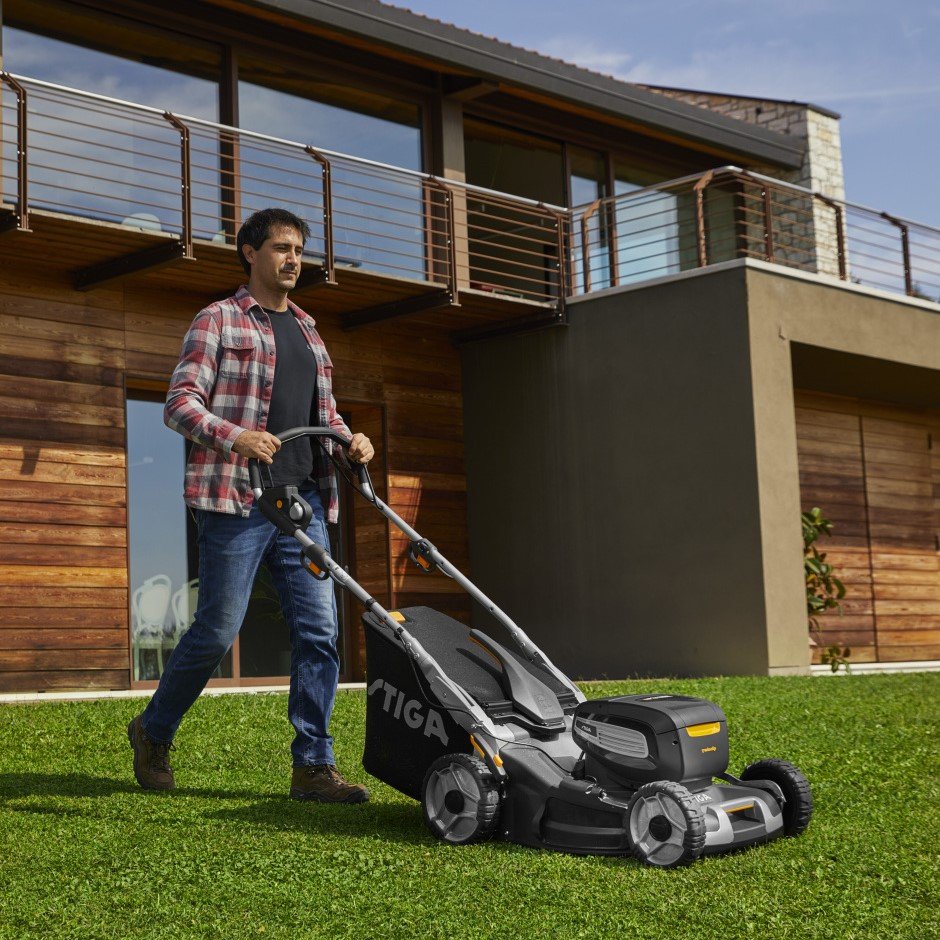Are you tired of the noise, emissions, and maintenance that come with using a traditional gasoline-powered lawn mower? If so, it may be time to consider switching to an environmentally-friendly option. In this article, we will explore the importance of choosing the right environmentally-friendly lawn mower batteries and how they can benefit both your lawn and the planet. From lithium-ion to lead-acid batteries, we will cover the different types available and help you make an informed decision. Say goodbye to the hassle and hello to a greener, quieter, and cleaner way to maintain your lawn.
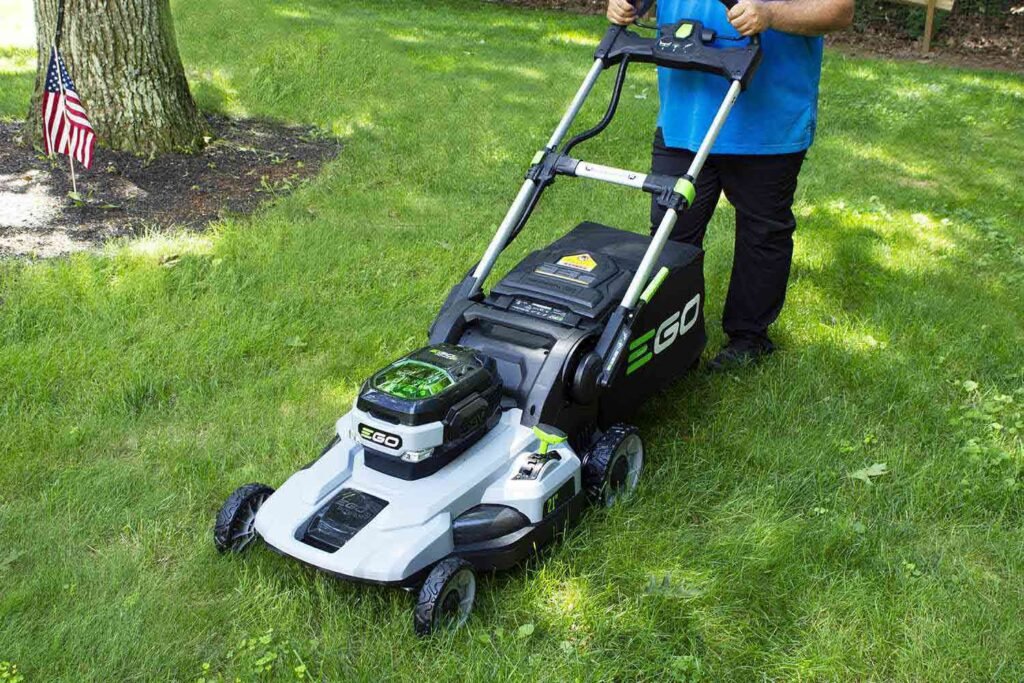
This image is property of www.thespruce.com.
Factors to Consider
When choosing the right environmentally-friendly lawn mower battery, there are several factors you need to consider. By evaluating these factors, you can ensure that you make an informed decision and select the battery that best meets your needs.
Battery Type
The first factor to consider is the battery type. There are three main types of batteries commonly used in lawn mowers: lead acid batteries, lithium-ion batteries, and nickel-cadmium batteries.
Lead acid batteries are the most traditional type of battery and have been used for many years. They are reliable and affordable but can be quite heavy and require regular maintenance.
Lithium-ion batteries are becoming increasingly popular due to their lightweight nature and long-lasting performance. They tend to have a higher initial cost but require less maintenance and offer a longer lifespan.
Nickel-cadmium batteries are known for their durability and resistance to extreme temperatures. However, they are less energy-efficient and can be more expensive compared to other battery types.
Considering the advantages and disadvantages of each battery type, you should choose the one that aligns with your specific needs and preferences.
Battery Capacity
Battery capacity is another crucial factor to consider when selecting an environmentally-friendly lawn mower battery. It determines how long the battery will power your lawn mower before it needs recharging.
To determine your needs, you should consider the size of your lawn and the amount of time it typically takes to mow it. A larger lawn with lots of grass to cut will generally require a battery with a higher capacity. On the other hand, if you have a small lawn, a battery with a lower capacity may be sufficient.
Battery capacity is typically measured in ampere-hour (Ah) rating. Higher Ah ratings indicate a longer battery life, providing you with more uninterrupted mowing time. Additionally, you should also consider the voltage of the battery, as it determines the power output.
Charging Time
Charging time is an essential factor to consider, especially if you have limited time for charging between mowing sessions. The charging time can vary depending on the battery type and charger used.
Some batteries offer fast charging capabilities, allowing you to quickly recharge the battery in a short amount of time. This can be convenient if you need to mow your lawn urgently and don’t have the luxury of waiting for hours for the battery to charge.
On the other hand, some batteries have a slower charging time but may offer a longer runtime. If you have ample time between mowing sessions and don’t mind waiting for the battery to charge, a slower charging battery may be suitable for you.
Battery Lifespan
The lifespan of the battery is an important factor to consider as it determines how long the battery will last before it needs to be replaced. A longer battery lifespan can save you money in the long run and reduce waste.
When evaluating battery lifespan, you should look at the warranty provided by the manufacturer. A longer warranty period generally indicates the manufacturer’s confidence in the battery’s durability and performance.
Additionally, proper maintenance can also prolong the battery’s lifespan. Regularly cleaning the battery terminals and following the manufacturer’s recommended maintenance practices can help extend the battery’s longevity.
Temperature sensitivity is another aspect that can impact the battery’s lifespan. Some batteries are more sensitive to extreme temperatures, which can affect their overall performance and lifespan. If you live in an area with extreme weather conditions, it’s essential to choose a battery that can withstand those conditions.
Compatibility
Compatibility is a crucial factor to consider when selecting an environmentally-friendly lawn mower battery. Not all batteries are compatible with all types of lawn mowers, so it’s essential to check the manufacturer’s recommendations.
Some manufacturers may offer conversion kits that allow you to adapt your lawn mower to be compatible with a specific battery type. These conversion kits can be a convenient solution if you have a preferred battery type but your lawn mower is not initially compatible with it.
By ensuring compatibility, you can avoid any potential issues and ensure that the battery fits seamlessly into your lawn mower, providing optimal performance.

This image is property of static.wixstatic.com.
Environmental Impact
As the focus on sustainability and environmental consciousness continues to grow, considering the environmental impact of the battery is crucial.
Recyclability
When choosing an environmentally-friendly lawn mower battery, it’s vital to select one that is recyclable. Recycling batteries helps prevent hazardous materials from entering landfills and reduces the demand for raw materials used in battery production.
Look for batteries that are marked as recyclable or those that have a clear recycling program implemented by the manufacturer. By choosing a recyclable battery, you can contribute to a more sustainable future.
Toxicity
The toxicity of the battery is another environmental factor to consider. Some batteries contain hazardous chemicals that can harm the environment if not handled or disposed of properly.
Lithium-ion batteries are generally considered less toxic compared to lead acid batteries and nickel-cadmium batteries. However, it’s essential to follow proper disposal guidelines for any type of battery to minimize environmental impact.
Energy Efficiency
Choosing an energy-efficient battery can have a positive impact on both the environment and your energy consumption. Energy-efficient batteries are designed to maximize the amount of energy produced from each charge, reducing waste and increasing overall performance.
Look for batteries that are labeled as energy-efficient or have higher energy efficiency ratings. By selecting an energy-efficient battery, you can mow your lawn while minimizing your ecological footprint.
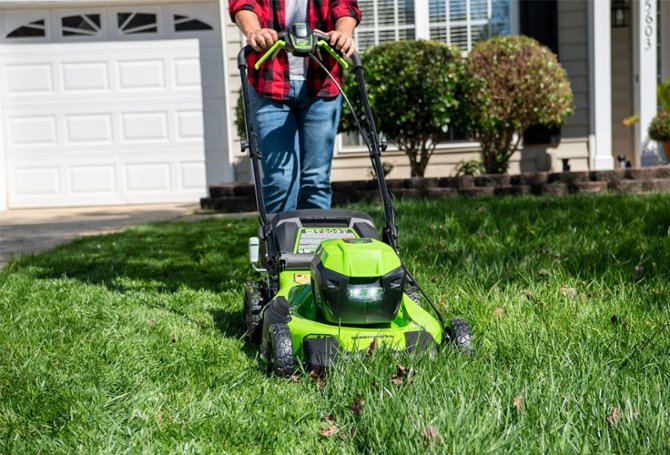
This image is property of pisces.bbystatic.com.
Cost
Cost is an important factor to consider when choosing an environmentally-friendly lawn mower battery. It’s essential to evaluate both the initial price of the battery and the operating cost over its lifespan.
Initial Price
The initial price of the battery refers to the cost you pay upfront to purchase the battery. Different battery types and brands can vary significantly in price.
While it can be tempting to opt for the cheapest option, it’s essential to consider the quality and durability of the battery. Investing in a higher-quality battery may have a higher initial cost but can save you money in the long run if it has a longer lifespan and requires less maintenance.
Operating Cost
In addition to the initial price, you should also consider the operating cost of the battery. This includes the cost of electricity needed to charge the battery and any ongoing maintenance expenses.
Some batteries may have a higher energy efficiency, resulting in lower electricity costs over time. Additionally, batteries with longer lifespans and warranties may require less frequent replacements, reducing the overall operating cost.
By evaluating both the initial price and operating cost, you can make an informed decision that aligns with your budget and long-term cost considerations.
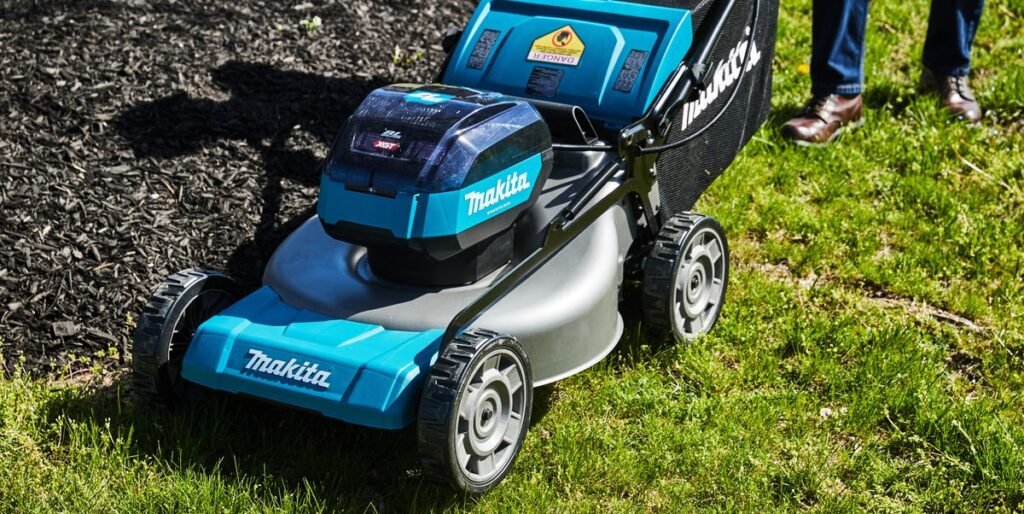
This image is property of hips.hearstapps.com.
User Reviews
When selecting an environmentally-friendly lawn mower battery, it can be helpful to consider user reviews. Customer ratings and feedback can provide valuable insights into the performance, durability, and overall satisfaction of the battery.
Customer Ratings
Customer ratings are a useful tool for understanding the satisfaction level of other users who have purchased and used the battery. By reading customer ratings, you can get an idea of the battery’s performance, reliability, and overall quality.
Look for batteries with higher customer ratings, as they are more likely to meet your expectations and provide a positive user experience.
Feedback
Reading feedback from other users can further enrich your understanding of the battery’s pros and cons. Pay attention to any common issues or concerns mentioned in the feedback and consider how they may impact your decision.
By considering user reviews, you can gain valuable insights from real-life experiences and make a more informed choice when selecting an environmentally-friendly lawn mower battery.
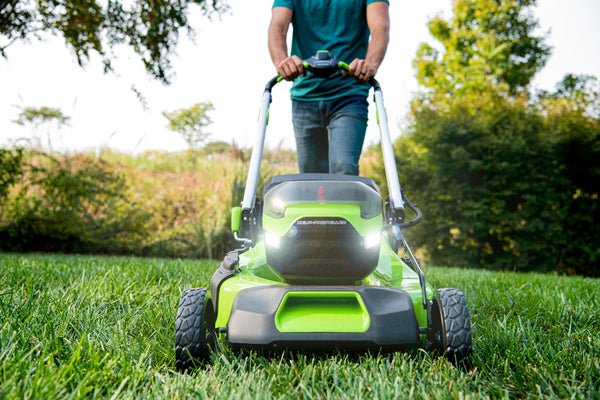
This image is property of www.greenworkstools.com.
Conclusion
Choosing the right environmentally-friendly lawn mower battery requires careful consideration of various factors. Battery type, capacity, charging time, lifespan, compatibility, environmental impact, cost, and user reviews are all essential aspects to evaluate.
By understanding your specific needs and preferences, you can select the battery that best suits your requirements, allowing you to mow your lawn efficiently while minimizing your environmental impact. Remember to prioritize sustainability, durability, and performance to ensure a reliable and eco-friendly solution for your lawn mower.

